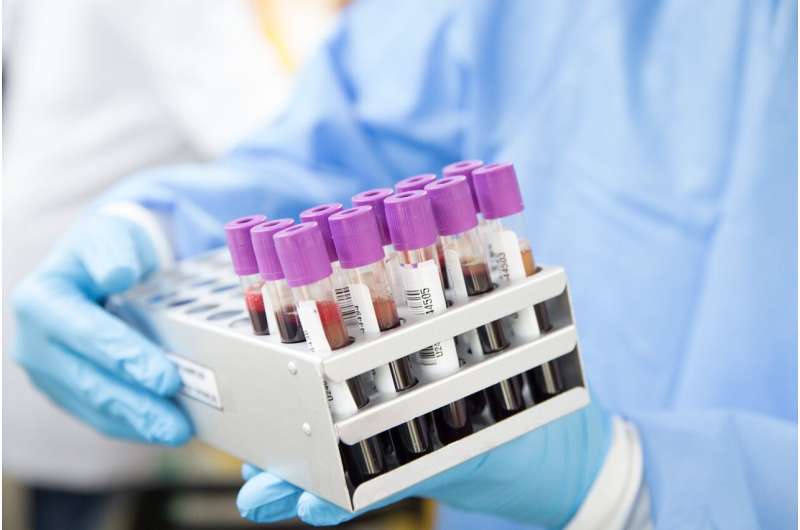This article has been reviewed according to Science X's editorial process and policies. Editors have highlighted the following attributes while ensuring the content's credibility:
fact-checked
peer-reviewed publication
trusted source
proofread
Simple blood test for Alzheimer's disease could change how the disease is detected and diagnosed

Trinity researchers have examined the effectiveness of a new blood test which could change the way Alzheimer's disease is identified. The blood test (plasma p-tau217) detects the presence of amyloid plaques that build up in the brain of people with Alzheimer's disease. In the Alzheimer's brain, abnormal levels of this naturally occurring protein clump together to form plaques that disrupt normal cell function.
A paper published in Alzheimer's Research & Therapy outlines a study undertaken by the Institute of Memory & Cognition at Tallaght University Hospital (TUH) which could change the way Alzheimer's disease is detected.
Researchers wanted to know if a simple blood test would be easier and more accurate than a lumbar puncture (spinal tap), which currently is the only method to detect amyloid plaques. The lumbar puncture is invasive, and scans are limited in their availability. The use of blood tests has clear advantages over both of these methods; being less invasive, more straightforward for patients, easier to scale up and less costly.
Using samples from the biobank at the TUH Institute of Memory and Cognition, study lead, Dr. Adam Dyer, examined the performance of the new blood test.
Adam is a geriatric medicine trainee at Tallaght University Hospital and Medical Gerontology, Trinity College Dublin. Patients who are undergoing a diagnostic lumbar puncture for the detection of Alzheimer's disease at TUH opt to donate cerebrospinal fluid and blood samples for future research. This is crucial in examining the performance of these new blood tests in real-world clinical cohorts.
The research examined how well the new blood test performed in detecting the same proteins (in particular "amyloid" protein) that are looked for in cerebrospinal fluid in samples from the existing biobank.
The potential for significant change in detection
Overall, the blood test was more than 90% as accurate as the outcome from lumbar punctures. Different blood test cut-off values were then examined and it was found that if—theoretically—the blood test was used in the future, over half of lumbar punctures could be avoided.
This has significant implications in terms of invasiveness, length of time to a diagnosis and also may reduce cost. Lumbar punctures are safe and well-tolerated as diagnostic procedures. However, a small number of individuals may experience side-effects such as post-lumbar-puncture headache.
Commenting on the research, Dr. Dyer said, "This study found that blood tests such as plasma p-tau217 demonstrate excellent performance to detect the changes that are characteristic of Alzheimer's disease.
"In the future, clinical use of these blood tests may enable us to avoid invasive tests such as lumbar punctures in over half of individuals who currently have these procedures performed. This research is one of a handful in the world to assess this in 'real-world' clinical cohorts and the first Irish study to examine the performance of these blood tests."
Moving forward, the next step in this research is to examine if the performance of these blood tests can be matched in diagnostic laboratories. This would mean that patients referred can hopefully have a blood test in the first instance, and that those who clearly have a negative or positive result could avoid the need for diagnostic lumbar puncture.
Commenting on the research, Professor Seán Kennelly, consultant physician in geriatric medicine and director of the Institute of Memory & Cognition, said, "A timely and accurate diagnosis of Alzheimer's disease is of paramount importance to living well with this condition, and our ability to support diagnosis using a simple blood test like this has the potential to revolutionize this area for affected people.
"We are so grateful to the people attending our clinical services, as none of this research would be possible without their generosity in agreeing to participate, which is such an important role of a teaching hospital."
More information: Adam H. Dyer et al, Performance of plasma p-tau217 for the detection of amyloid-β positivity in a memory clinic cohort using an electrochemiluminescence immunoassay, Alzheimer's Research & Therapy (2024). DOI: 10.1186/s13195-024-01555-z




















